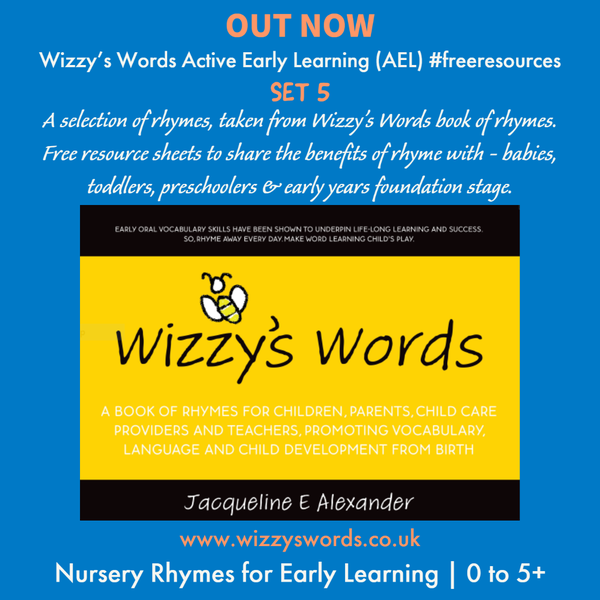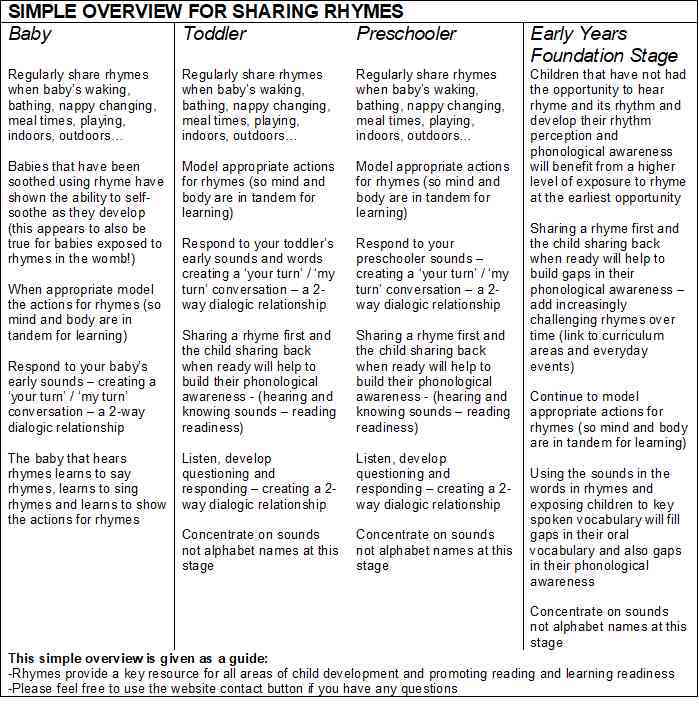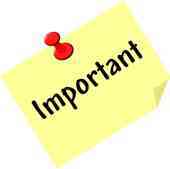Supporting Children | Early learning #nurseryrhymes #earlyeducation #development | 0 to 5+ | Wizzy’s Words AEL Set 5 A-J #freeresources

Wizzy’s Words Book of Rhymes for #earlylearning &
Wizzy’s Words AEL (Active Early Learning) #freeresources
SET 5 | A-J | TODDLER TO PRESCHOOLER TO FOUNDATION STAGE AND BEYOND | BUILDING ON SETS 1,2,3 AND 4
For set 5 free resources see blog posts 64-73 and corresponding videos
 Wizzy’s Words | Early Learning in ACTION using rhythm and rhyme | Birth to 5+
Wizzy’s Words | Early Learning in ACTION using rhythm and rhyme | Birth to 5+
Laying the foundations for and promoting bonding, development, filling the word gap and the development of reading and learning readiness
SHARE OFTEN AND ACTIVELY FROM BIRTH TO 5 PLUS
Wizzy’s Words | A social not-for-profit initiative/resource, developed and published to support early years development and learning readiness. A book of 70 rhymes for today, based on research and validated child and language development data*. The rhymes contain the key spoken vocabulary that if developed before school or at the earliest opportunity, is associated with successful learning outcomes.
Furthermore, active, early exposure to rhyme and its rhythm promotes physical development and rhythm perception both of which also contribute to successful, healthy, early and lifelong learning.
Wizzy’s Words Active Early Learning (AEL) #freeresources Once again based on child and language development research*, including how to support parents, childcare providers and educators to support infant development and learning. A selection of rhymes taken from Wizzy’s Words book of rhymes have been used to create Wizzy’s Words AEL resource sheets. Each sheet can be adapted for baby (prenatal and from birth to walking), toddler (building on walking up to age 3), preschooler (building on previous stages as appropriate and generally from age 3 to 5) or early years foundation stage (overlapping and building on the previous stages as appropriate and beyond the preschooler stage to 5 and beyond). The stages are not prescriptive and should be seen as a guide. A child that enjoys a rhyme should continue to enjoy reciting and adding actions to it whilst gradually being presented with more challenging rhymes to facilitate progression.
Each rhyme is presented with suggested actions in line with developmental milestones and the accompanying videos modelling the actions can be used as a guide. Sharing the rhymes from the resource sheets regularly and with the actions, from birth, will lead to the natural development of language and also promote development across all areas of child development. Reading and learning readiness, the key for early and lifelong learning, will be achieved as the child moves from hearing to saying to singing and moving to the rhymes. The resource sheets and accompanying videos are freely available, see links below. on the Wizzy’s Words website | YouTube | Times Ed – Early Years Resources area | Pinterest
It is important to note that although infants generally follow the same developmental path, they do this at different rates. Use Wizzy’s Words AEL resources for language play at an infant’s developmental rate and add in increasingly challenging rhymes as appropriate.



From baby to toddler to preschooler to early years foundation stage and beyond
ACTIVELY sharing appropriate, increasingly challenging rhymes with infants from birth promotes:
> Parent and infant bonding (a basis for co-regulation and self-regulation)
> Listening and speaking (communication and language development)
> Physical development (gross motor and fine motor development)
> Cognitive development (thinking, discovering, problem solving…)
> Social and emotional development (relate to adults & others/recognize & manage feelings)
> Knowledge and understanding of the world (and its vocabulary)
BUILDING physical and mental health and school, reading and learning readiness
Use regularly for fun and active language play.
For parents, childcare providers and educational practitioners the important thing, to ensure progress, is to move from early simple rhymes and rhythms to include increasingly more challenging ones over time. At the same time, it is important in the early years and beyond to acknowledge the value of repetition. When a child says one more time, they benefit from repeated exposure to cues that build and reinforce the neural connections that determine successful learning.
It is not necessary to be a musician in order to create a rhythmic, language rich environment for the developing child. Developing rhythm perception with and without music is associated with successful learning outcomes. Infants are innately tuned to enjoy music and rhythm, in line with their innate natural rhythm. From hearing to saying to singing and moving to a rhythm, all aid early development and the development of learning and reading readiness.
Try using props (pans, spoons etc) and puppets (socks…) to make sounds and add dramatical voices with older infants. Infants up to approximately age one, prefer infant directed speech, often referred to as baby babble or baby talk, in their first year as opposed to adult directed speech.
The key spoken words embedded in the resources are taken from measures of spoken word frequency and are also key for successful lifelong learning. Help children to spot and use words and their sounds in everyday activities.
In the baby to toddler to preschool stages infants generally have moved from lying and supported sitting and rolling to…
Independent sitting and rolling | crawling and reaching | squatting and supported walking to independent steady walking and are ready to develop their running, jumping, hopping, kicking and catching skills…
There is no need to rush, each of these stages are important in the building of the gross motor development needed for developing fine motor skills. Share the rhymes and add actions as indicated and link in to next steps for your child as appropriate.
INCORPORATE LOTS OF OPPORTUNITIES FOR PHYSICAL DEVELOPMENT AND SUPPORTING CHILDREN AS THEY MOVE FROM THE CRAWLING STAGE, AN IMPORTANT STAGE
BECAUSE…
Crawling will support the development of abdominal, shoulder and hip muscles, all of which are important for movement, stability and balance. Furthermore, crawling permits the development of strong wrists and facilitates sensory input to the hands which will support the development of fine motor skills.
PROMOTE OPPORTUNITIES FOR CROSS LATERAL MOVEMENTS AND BALANCING
BECAUSE…
Cross lateral movements, for example touching the right ear with the left hand and vice versa ensures that both hemispheres of the brain are activated, enhancing and building on the innate neural connections that determine development and learning. Binocular vision and eye tracking are also developing alongside the physical milestones and are also important components of the neural network that facilitates development and learning.
Developing balance, although not often talked about, is associated with developing concentration skills and also sports skills.
PROMOTE OPPORTUNITIES FOR LINKING THE CONTENT OF RHYMES TO EVERYDAY KNOWLEDGE AND UNDERSTANDING
BECAUSE…
Wizzy’s Words rhymes have been developed to contain the key preschool vocabulary that is associated with early and lifelong successful learning. Rhyme has been used in developing Wizzy’s Words and Wizzy’s Words AEL, as developing rhythm perception before school is also associated with successful educational outcomes. The rhymes have been carefully matched to images to promote sharing and extending infants’ oral language. Furthermore, the 70 rhymes incorporate elements of the Early Years Foundation Stage to promote holistic learning. For example, providing opportunities to promote physical development and develop knowledge of early number, healthy eating, recycling, the weather and more. Taking learning outdoors at every opportunity is also associated with good learning outcomes and is recommended where possible.
Wizzy’s Words AEL resources have been guided by and carefully developed with developmental milestones and the early years foundation stage in mind. This will help parents, childcare providers and educational practitioners to provide appropriate support for optimal development and learning for all children and at an appropriate level.



Simple overview for sharing rhymes




The holistic role of rhyme in childhood development and learning
Whilst language can be seen to be the basis for development across a number of the domains of child development, research shows the importance of adopting a holistic approach to child development. Rhymes with their simple repetitive language and rhythms are an ideal holistic learning resource. For example, indoor and outdoor experiences and physical activity promote healthy learning and lifestyles. Rhymes and language play should be taken outdoors at every opportunity.
Regardless of when a child meets developmental milestones, a general pattern can be used as a guide. Importantly, developing gross motor skills, i.e., progressing through physical developmental milestones, is vital for the development of fine motor skills. For example, using a pair of scissors or holding a pencil requires the use of fine motor skills. Furthermore, if the stages of gross motor skill development are neglected, not only is a child less able to accomplish fine motor skill development but they are also more susceptible to physical injury throughout their lifetime. Where children may have missed out on developing key gross motor skills or need fuller support to develop them, rhymes provide an ideal resource for doing this.
Research* shows that the eye contact used in early interactions (at the developmental level of the child, not forced) together with/or close body contact and actions that promote development of both hemispheres of the brain support healthy child development. Furthermore, actions that then start to involve crossing the midline (e.g., right hand to left knee tapping and vice versa) are important. This developmental skill is involved for example in tracking and hitting a ball in sport, writing from left to right and everyday skills for example using both hands to put on socks or shoes. You will notice that the suggested actions incorporate these findings.
The aim of Wizzy’s Words is to provide a practical, accessible, universal and educational resource for parents, child care providers and educational practitioners, that can be used to support and promote early childhood development and therefore learning. It arose from my classroom practice where I saw children entering school ‘unready’ for reading and learning and then often not being able to access the benefits of education. My research confirmed that ‘This matters because when you’re behind from the start you rarely catch up’ (Hinds, 2018, Secretary of State for Education)



*To request a copy of the research that Wizzy’s Words and its EAL resources are based on please send me an email wizzyswords@gmail.com or use the contact button on the Wizzy’s Words website
Jacqueline




Wizzy’s Words #freeresources are based on a standalone selection of rhymes
If you decide to buy the book - DO NOT LEAVE IT ON THE BOOKSHELF! Keep it in & around the toybox, house, garden, nursery, classroom… for regular, active, fun, language play
(Follow the links for further information and preferred retailers - (RRP £9.99 – see offers and also eBook and audiobook formats)
Book links (RRP £9.99 - see current offers – also available in eBook and audiobook formats) http://www.troubador.co.uk/bookshop/young-children/wizzys-words
https://www.amazon.co.uk/Wizzys-Words-Jacqueline-Alexander/dp/1800464274
Research #podcast links
https://www.buzzsprout.com/1267127/11717549-the-power-of-rhyme-with-jacqueline-alexander
https://sueatkinsparentingcoach.com/parentverse-expert-interviews/jacqueline-alexander/
Free resources links
https://wizzyswords.co.uk/blog/44/wizzys-words-ael-overview/
https://www.tes.com/member/Jaxxie
https://www.youtube.com/channel/UCDibe99mIef2c4aSdFLqBsw
You can follow Wizzy’s Words on all the usual social media channels by just searching for Wizzy’s Words